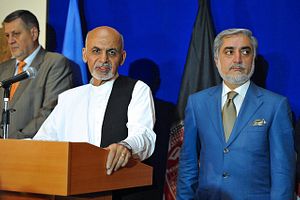After months of wrangling, Afghanistan’s two leading presidential candidates, Ashraf Ghani and Abdullah Abdullah, have agreed to form a new government of national unity. Brokered by U.S. Secretary of State John Kerry and strongly supported by the international community, the agreement puts an end, at least temporarily, to political instability that has several times threatened to escalate into ethnic violence and that has certainly encouraged the Taliban while damaging Afghanistan’s fragile economy.
This agreement represents an act of responsibility on the part of the two candidates, albeit one strongly nudged by the threat of the end of the international aid that keeps the Afghan state apparatus afloat. As such, it is a major success for American diplomacy, which has averted for now at least an unraveling of its reconstruction efforts in Afghanistan since 2001, which now total more than $109 billion, according to the latest report the U.S. Special Inspector General for Afghanistan Reconstruction (SIGAR), or more in equivalent dollars than the U.S. spent on the Marshall Plan.
The success of forming the unity government is at any rate belated and partial. The elections this year were meant to showcase Afghanistan’s progress over the past 13 years, and its democratic maturity. In fact, the polls showed a country still cursed by ethnic tensions and a political class still reluctant to sacrifice its own interests for the greater good. True, Abdullah and Ghani, with great reluctance, managed to reach an agreement. Whether their respective supporters will continue to show the same restraint is another matter.
And so the questions now are whether this power sharing scheme will be able to withstand the blows that will inevitably be unleashed from both sides and whether it will prove adequate to meeting the tremendous challenges the country will face in the coming years.
One immediate concern is the uncertainty surrounding the actual division of powers established by the agreement. The unity government features a new figure, one not mentioned in Afghanistan’s Constitution, namely the Chief Executive Officer (CEO), a role equivalent to that of a prime minister, to be held by Abdullah Abdullah or someone he nominates. The CEO will chair a newly created council of ministers and will be responsible for managing the execution of government policy. He will report to the president directly. The latter will lead the cabinet, which will also include the ministers.
The president and CEO are to have equal powers with respect to the appointment of heads of key economic and security institutions, as well as independent agencies. However, the agreement has not defined how this hybrid system will actually function, appealing instead to the “commitment of both sides to partnership, collegiality, collaboration and most importantly, responsibility to the people of Afghanistan.” That is something of a leap in the dark.
A national unity government may well have been the best solution for Afghanistan’s political impasse, but the controversy and acrimony that attended its birth will be hard to overcome. The complex power structure outlined by the agreement could also impede government action, delaying much-needed reforms.
For instance, the government needs to sign the Bilateral Security Agreement (BSA) with the United States. This is essential if the U.S. is to have a presence in Afghanistan beyond 2014.
Moreover, urgent reforms are needed for the economy. GDP growth slowed from 14.4 percent in 2012 to just 4.2 percent last year, foiling the government’s attempts to boost domestic revenue sources and keeping it reliant on foreign aid. Despite impressive overall economic growth since 2002, and the benefits of international support, the Afghan economy remains tiny at just $20 billion and one of the world’s poorest. Its more dynamic sectors, such as construction, are those most susceptible to the end of the International Security Assistance Force mission.
It will be up to a loya jirga, the traditional Afghan consultative body, to decide, in two years, whether to amend the Constitution to formalize the hybrid presidential system that has been created. In the interim, the Afghan leadership will need to demonstrate legitimacy, after months of mutual accusations. That means showing the government is able to ensure the safety and well-being of its people. It will not be an easy task.

































